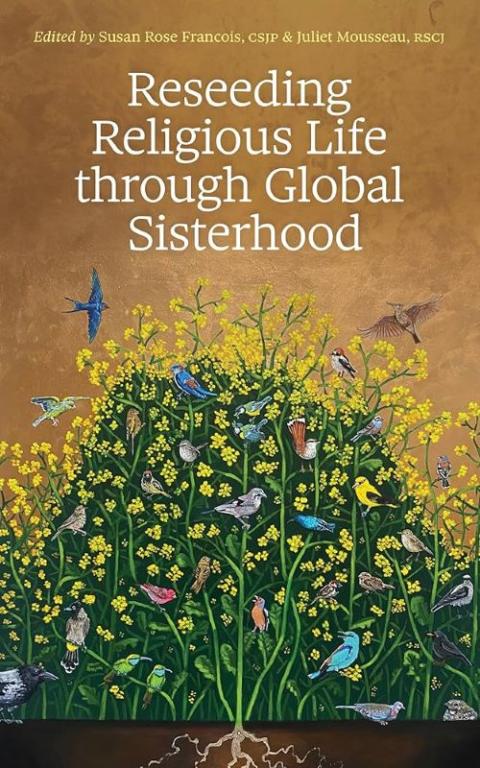
Srs. Susan Rose Francois, left, and Juliet Mousseau are the co-editors of "Reseeding Religious Life Through Global Sisterhood." (GSR graphic/Courtesy photos)
It would be easy to see religious life in the United States as something from another time, as a vocation whose time has come and gone.
But a group of 10 millennial and Generation X sisters have a few things to say about that.
Reseeding Religious Life Through Global Sisterhood is a collection of essays by younger sisters who see religious life not as a collection of separate congregations, but as a worldwide movement of women who have dedicated their lives to Jesus and his church, and are deeply connected to one another, regardless of the changes taking place.
Sacred Heart Sr. Juliet Mousseau, who co-edited the book with St. Joseph of Peace Sr. Susan Rose Francois, said all those involved with the project felt the weight of its importance.
"We're at a moment of change in religious life," Mousseau said. "It can seem either very hopeless or as a moment of immense possibility."
Francois said the book's title comes from a play on the word "receding," and the tendency to focus on diminishment.
"There's so much focus on that, but this book is focused on the other side of that equation," she said. " … It's a different perspective."
Mousseau currently serves as the vice president for academic affairs at the Franciscan School of Theology in San Diego. Trained as an historical theologian, her writings include medieval theology, the history of her congregation and contemporary questions in religious life. Previous books include 2021's Prophetic Witnesses to Joy: A Theology of the Vowed Life.
Francois is the assistant congregation leader for her community and is the author of the 2021 book My Friend Joe: Reflections on St. Joseph.
Mousseau also co-edited the 2018 book, In Our Own Words, which Francois contributed to

"Reseeding Religious Life Through Global Sisterhood" is a collection of essays by younger sisters.
The new book contains nine essays by a wide range of sisters, including Living Word Sr. Chioma Ahanihu, Verbum Dei Missionary Fraternity Sr. Monica Marie Cardona, Incarnate Word Sr. Ricca Dimalibot, Providence Sr. Tracey Horan, Incarnate Word Sr. Katty Huanuco, Poor Handmaids Sr. Nkechi Iwuoha, Dubuque Franciscan Sr. Sarah Kohles, as well as by Francois and Mousseau, and an afterward by Incarnate Word Sr. Teresa Maya.
GSR: Putting a book together is an immense project in itself. Getting 10 busy sisters to line up their schedules and work together might be even more difficult. Yet you two pulled it off.
Mousseau: Part of it was that we weren't just collecting essays, this was more about building relationships. We had conversations as a group about what are you seeing, what are the characteristics of the things you're experiencing. This was a little more interactive with the group as a whole.
Francois: I was really struck by how honest those conversations were. There is clearly a deep love of religious life, but also bewilderment at what is required in this change of era. There were some personal struggles these women were willing to share with us, but they were shared in hope. I suspect that as people read those stories, they will be as touched as we were.
GSR: It seems that the more we're willing to share our struggles, the things we believe make us different from everyone else, the stronger the connection we make as we realize we're all alike.
Mousseau: These are the conversations we need to have, where we talk about how we're connected. Very often I find that when someone is struggling with the same things I am, there's a sisterhood in that. It means so much to me to have companions on the journey, even if we're not in the same congregations.
Even if we're not struggling with the same things, we have the connection through our ministry, and more and more congregations are working together and collaborating.
Francois: The older generations of sisters have a different experience and perspective on collaboration. But the younger sisters, for 20 years we've had intercongregational formation from the day we walked in the door. I hope this will be an incubator for the collaboration we have to do at this time.
Mousseau: Historically, sisters were in competition with each other. In competition for students at their schools, in competition for new sisters. We don't need to do that anymore, but there's still that mentality. But the next generations, we don't have that same sense of competition because we don't have enough sisters to do the work, so we have to collaborate. But there's also power in recognizing the global sisterhood we all share.
GSR: People are not good with change. How do we keep the focus on what is newly emerging in religious life instead of only mourning what seems to be going away?
Mousseau: As a historical theologian, I know it takes 150 years for reform to take root. Vatican II was only 60 years ago, we've got another century of work ahead. But what always strikes me is the old ways don't go away, the new ways coexist next to them. When the Dominicans appeared in the 1200s, it was a totally new form of religious life, but the Benedictines, founded hundreds of years before, still existed. There's always going to be multiple ways of doing this, it's not always going to be just our way.
Francois: We have one author [Verbum Dei Missionary Fraternity Sr. Monica Marie Cardona] whose community is only 60 years old, and they have shared governments between sisters, priests and married couples. It's completely different, but we always have to be open to renewal.
We also have to recognize that Juliet and I are white women, but about half the women entering religious life today are not — that's a form of renewal. There are also many sisters born in a different country but ministering in the United States — that's also renewal.
Advertisement
GSR: There are some who say the shrinking number of women religious in this country is because the reforms after Vatican II led congregations to drift away from true religious life, and things such as wearing habits or living in one large convent.
Francois: I clearly state in my chapter that God is calling the exact number and quality of women to religious life that is needed at this time. Smaller numbers are not because of any failure — the large numbers were an anomaly. Our call is to be on the margin, to look at the needs of the age that are not being met. We don't need hospitals where every employee is a nun, but women are still being called — brilliant women with deep, deep hearts and a willingness to serve God.
Mousseau: I think one of the things Vatican II did and that the synod on synodality is promoting is lay leadership within the church. What that means is the women who are being called have a very, very deep commitment to this life, and religious life enables them to serve on the margins in a way that would be difficult for lay people. We might be fewer than before, but that doesn't mean our call is any less genuine.





